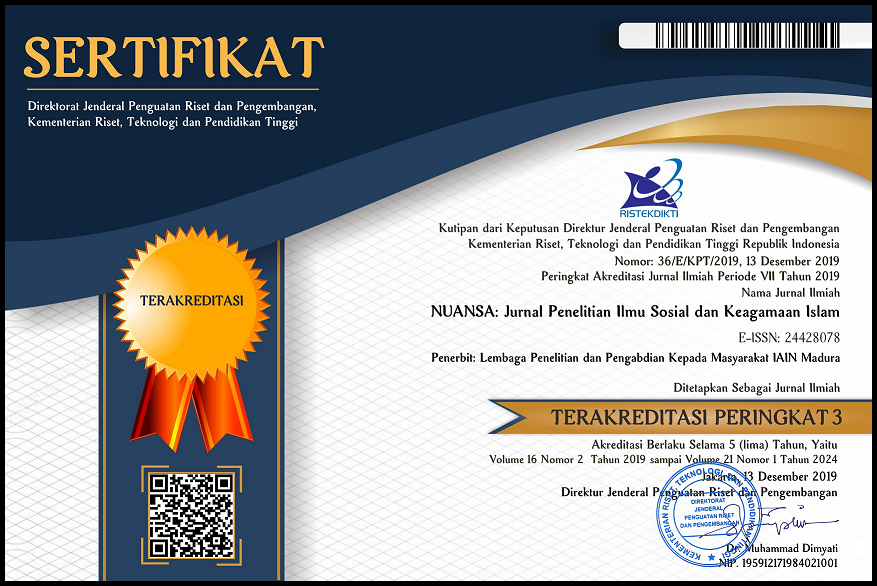MEMUDARNYA TRADISI TER-ATER PADA ERA GLOBALISASI DI DESA WARU BARAT PAMEKASAN MADURA
 Abstract views: 109
,
Abstract views: 109
,
 PDF downloads: 161
PDF downloads: 161
Abstract
Every human being will inevitably experience changes in their life, especially in the era globalization. The Ter-ater tradition is a custom of delivering food, such as rice and side dishes or cakes to family and neighbors. This study aims to identify the factors causing the fading of the Ter-ater tradition in the era globalization in Waru Barat Village, Pamekasan. This research is qualitative. The methods used in this study include observation, interviews, and document studies. The research location is Waru Barat Village, Pamekasan, specifically in Tobalang III Hamlet. The results of the study indicate that the community has been affected by the current of globalization, leading to the fading of the Ter-ater tradition. Changes in lifestyle towards individualism, urbanization, and economic factors are the reasons behind the decline of the Ter-ater tradition.
Downloads
References
Anisah, Nur Fadiah. "Tradisi Ter-ater Dalam Harmonisasi Sosial: Resolusi Konflik Dalam Kontestasi Pilkades Bilapora Barat". Retorik: Jurnal Ilmu Humaniora 10, no. 1 (2022): 1–15. doi:10.24071/ret.v10i1.4698
Bahri, Saiful, dan Emi Tipuk Lestari. “Implementasi Pengembangan Nilai Peduli Sosial Melalui Tradisi Ter-ater Masyarakat Suku Madura Pada Pembelajaran Ilmu Pengetahuan Sosial”. REFLEKSI EDUKATIKA: Jurnal Ilmiah Kependidikan 10, no.2 (2020).
Fauzy, Ahmad, Metodologi Penelitian (CV. Pena Persada, 2022).
Hartatik, Astri, dan Ahmad Sudi Pratikno. “Pudarnya Eksistensi Kesenian Tradisional Ludruk Akibat Globalisasi Budaya”. Jurnal Ilmiah CIVIS, 12 (2023).
Hidayat, Ainurrahman. “Dimensi Epistemologis Tradisi Ritual Samman Dalam Masyarakat Budaya (Telaah Dalam Perspektif Epistemologi “Abd Al-Jabbar)”. (2007).
Holis, Khoirul, dan Atik Silvia. “Relasi Agama Dan Kearifan Lokal Dalam Tradisi Ter-ater Di Pamekasan, Indonesia”. Al-Adabiya: Jurnal Kebudayaan Dan Keagamaan 19, no.1 (2024): 35–52. doi:10.37680/adabiya.v19i1.3702
Ichsan, Ahmad Shofiyuddin, Ichlasul Diaz Sembiring, dan Naurah Luthfiah, “Pendidikan Islam Menghadapi Tradisi, Transisi, Dan Modernisasi”, Fitrah: Journal of Islamic Education 1, no.1 (2020): 107–23. doi:10.53802/fitrah.v1i1.11
J. Moleong, Lexy. Metodologi Penelitian Kualitatif. (PT. Remaja Rosdakarya, 2016)
Jailani, Abdul Kodir, dan Rio Febriannur Rachman, “KAJIAN SEMIOTIK BUDAYA MASYARAKAT: Nilai Keislaman Dalam Tradisi Ter-ater Di Lumajang”, MUHARRIK: Jurnal Dakwah Dan Sosial 3, no.2 (2020): 125–37. doi:10.37680/muharrik.v3i02.460
Khairani. “Tradisi Ngantat Salin Dalam Era Modernisasi Pada Masyarakat Desa Ulak Kerbau Baru Kecamatan Tanjung Raja Kabupaten Ogan Ilir”. Tanjak: Jurnal Sejarah Dan Peradaban Islam 4, no.3 (2024)
Nurmaulida, Amiladini, “POTENSI MEMUDARNYA BUDAYA SUKU BADUY LUAR TERHADAP ERA GLOBALISASI Oleh”, Sitakara: Jurnal Pendidikan Seni & Seni Budaya 8, no.1 (2023)
Prateksa, Ardhanareswari, Jazidan Dzikri Fillah, Juwita Aulia Chika Putri, Lailatus Sakdiyah, Reni Indahsari, dan Aditia Muhammad Noor. “Agama Dan Relasi Budaya Sedekah Laut Di Pesisir Kota Pati”. At-Tuhfah: Jurnal Studi Keislaman 11, no.1 (2023)
Wiyono, Hadi, dan Iwan Ramadhan. “Pergeseran Tradisi Belalek Dalam Budaya Bertani Masyarakat Melayu Sambas”. Jurnal Studi Agama Dan Masyarakat 17, no.1 (2021): 1–9. doi:10.23971/jsam.v17i1.2880
Copyright (c) 2025 NUANSA: Jurnal Penelitian Ilmu Sosial dan Keagamaan Islam

This work is licensed under a Creative Commons Attribution-NonCommercial 4.0 International License.
The journal operates an Open Access policy under a Creative Commons Attribution-NonCommercial 4.0 International License (CC-BY-NC) 
Authors who publish with this journal agree to the following terms:
- Authors retain copyright and grant the journal right of first publication with the work simultaneously licensed under a Creative Commons Attribution License that allows others to share the work with an acknowledgement of the work's authorship and initial publication in this journal.
- Authors are able to enter into separate, additional contractual arrangements for the non-exclusive distribution of the journal's published version of the work (e.g., post it to an institutional repository or publish it in a book), with an acknowledgement of its initial publication in this journal.
- Authors are permitted and encouraged to post their work online (e.g., in institutional repositories or on their website) prior to and during the submission process, as it can lead to productive exchanges, as well as earlier and greater citation of published work.





















